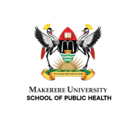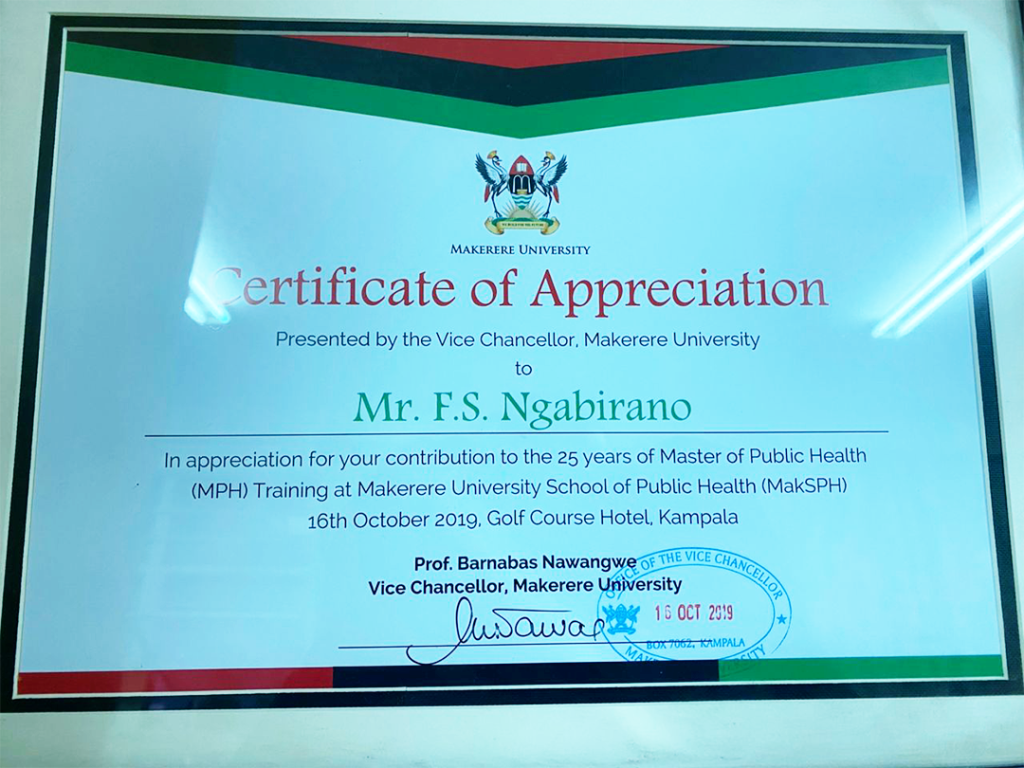


When the history of public health training in Uganda is told, honestly, fully, and with the respect it deserves, the name Francis Seletze Ngabirano must stand at the center of that story. For 32 years, he was one of the most consistent figures at Makerere’s Department of Preventive Medicine, now the Institute (and later, School) of Public Health. Through leadership transitions, political upheavals, and moments when the institution teetered on collapse, he carried with him a quiet, steady force, one that helped keep the wheels turning and the vision alive.
Thirteen years after Makerere University was established, a boy was born in the rolling hills of Kigezi on 18 November 1935. His parents named him Francis Seletze Ngabirano. At that time, no one could have imagined that this young boy would one day dedicate his life to Uganda’s premier and oldest university. Guided by his parents’ commitment to discipline and service, Francis began school in 1945 at the age of ten. He completed his primary education in 1950 before proceeding to secondary school from 1951 to 1956.
By the late 1950s, long before the Makerere University Institute of Public Health was conceived, he was already doing the work that would define his life, administration in health settings. From Kilembe Mines Hospital, where he managed medical records and supervised clerical staff from 1957 to 1960, to the Ross Institute of Tropical Hygiene (East Africa Branch) from 1961 to 1963, where he served as Technical Assistant to the Principal Officer and helped set up regional health research operations across Kenya, Uganda, Tanzania, Malawi, and Zambia, his career was expanding beyond borders. Even as a young man, he had already become someone institutions could trust.
During this same period, he also served as Assistant Chief Health Educator with the African Medical and Research Foundation (AMREF), then a fast-growing regional health organization headquartered in Nairobi. His work took him directly into communities, organizing health education courses in schools and villages, gathering and analysing sickness data from local industries, and supervising the support staff who kept these outreach operations running. It was practical, people-focused work that demanded both empathy and discipline, qualities he carried throughout his career.

He strengthened his skills through further training in health education and public health administration at Kenyatta National Hospital, at the Hebrew University–Hadassah Medical School in Israel, and later at the University of Thessaloniki in Greece. These experiences gave him both global exposure and a strong command of public health systems, qualifications few Ugandans had at the time.
So, when he joined Makerere on 1 November 1968 as an Epidemiology Office Assistant, a role created specifically to accommodate his expertise, he arrived not as a beginner, but as a professional already shaped by years of responsibility.
As recorded in handwritten notes by Professor Suleiman Jabir Farsey on May 13, 1974:
“Mr. Ngabirano joined the Department in November 1968, and was appointed ‘Epidemiology Office Assistant.’ The records available in the Department indicate that Mr. Ngabirano was recruited for administrative duties, but because there was no provision in the establishment for such a post at the time, the post of Public Health Nursing Instructor was altered to one of Epidemiology Office Assistant,” wrote Professor Farsey, then Head of the Department of Preventive Medicine (1968–1975).
The early Institute of Public Health (IPH) was a small but ambitious unit within the Faculty of Medicine. It was led by Prof. Jabir Farsey as a Department of Preventive Medicine and supported by pioneering Ugandans such as Dr. Josephine Namboze, Dr. V. L. Ongom, Mr. S. K. Lwanga, Dr. M. L. Kakande, and Dr. B. Baitera. Behind this frontline of academics was a steady force, administrators like Mr. Ngabirano, making sure that teaching, research, and community outreach worked without disruption.
It is worth noting that Mr. Ngabirano witnessed the birth and transformation of the Department of Preventive Medicine into the first Institute of Public Health in Sub-Saharan Africa on 1 July 1975. The Institute was still under the Faculty of Medicine, then headed by Professor Joseph Lutwama, with Professor Jabir Farsey as its first head. Ngabirano also saw the construction of the four-story building that now houses MakSPH, completed in January 1971, along with the installation of furniture and essential facilities.
From his personal account, the idea of establishing an Institute had been conceived as early as 1967. However, the rise of Idi Amin delayed these plans and triggered the departure of remaining expatriates, including Dr. George Saxton, an American who had directed Kasangati Health Centre and taught in an honorary capacity in the Department of Preventive Medicine. Dr. Saxton, after a brief visit to Europe, returned with an aid package secured from the governments of Denmark and Norway, the funding that ultimately made the current MakSPH building possible. Saxton understood that creating an Institute required space, as staff and students had been cramped in the Clinical Research Building.
All these years, Ngabirano managed everything: financial records, planning epidemiological field tours, supervising personnel, coordinating WHO projects, handling stores and vehicles, and doing so with a thoroughness colleagues would later describe as his trademark.
Over the years, five heads of the Institute came and went: Prof. Jabir Farsey (1968-1975), Prof. Capt. Dr. Virginio Lachora Ongom (1975-1979), Prof. Josephine Namboze (1979-1988), Prof. John Tuhe Kakitahi (1988-1991), and Prof. Gilbert Bukenya (1991-1994), later replaced by Prof. Frederick Wabwire-Mangen (1995-2003). Directors changed, structures shifted, crises erupted… but Ngabirano remained.
His desk was where continuity lived.
Many people who lived through Uganda’s chaotic 1970s chose silence. But Mr. Ngabirano documented. His unpublished 1995 manuscript, The Institute of Public Health Through Idi Amin’s Rule, is one of the most significant historical accounts of Makerere’s public health training during a time when institutional memory was at risk of disappearing.
His writing describes:
The early Amin years saw a mass departure of academic staff. Prof. Farsey resigned in 1975, and Prof. Ongom died suddenly in 1979. Tragic losses of colleagues, Dr. Baitera, Dr. Kakande, and Mr. Asaba, further strained morale. Low salaries and dwindling staff eventually led to the discontinuation of the Diploma in Public Health in 1988.
These were not just institutional events; they shaped people’s lives. They tested loyalty, purpose, and endurance. Through all this, the Institute survived because of administrators who refused to let the vision fade. Few stood more firmly in that resolve than Mr. Ngabirano.
His influence is most vividly remembered in the 1990s with the introduction of the two-year Master of Public Health (MPH) Degree Full-time Programme based on the concept of a Public Health Schools Without Walls (PHSWOW).
With support from the Rockefeller Foundation, this innovative model took training into district health systems; Rakai, Hoima, Fort Portal, Arua, Karamoja, Mukono, immersing students in real public health challenges. Administration for such a programme required: diplomacy, logistical mastery, pastoral care, financial stewardship, and calm leadership across diverse teams. Mr. Ngabirano excelled in every one.
Prof. Fred Wabwire-Mangen, then Director of IPH, remembers him as:
“A focused and organised administrator… the typical administrator of the olden days. He documented every detail clearly and ensured medical student fieldwork ran smoothly.”
Prof. Nazarius Mbona Tumwesigye, who joined when Ngabirano was already a pillar of the Institute, offers this reflection:
“He served the School diligently. The administrator was the engine of the Institute. Directors often travelled, but he ensured day-to-day affairs continued uninterrupted. He sustained this place when salaries were meagre and conditions extremely difficult.”
To young staff, he was not just a supervisor; he was guidance, stability, and care.
In 1993, a new graduate student, Professor Christopher Garimoi Orach, joined Makerere, encouraged by Prof. Gilbert Bukenya to pursue the Master of Medicine in Public Health (MMED PH). That programme would later evolve into the modern two-year MPH. One of the first people he encountered was Mr. Ngabirano.
Prof. Orach remembers him vividly and eulogises him:
“Francis Ngabirano worked with great dedication, commitment, and distinction at the Institute of Public Health. He was passionate about his work as an Administrator, humorous, smart, and ever-present. He interacted easily with faculty and students, always supportive. Rest thee well, Francis. You rendered your service admirably, with great love, passion, and honor. Rest now with the Creator, the giver and taker, in tranquility, in a place well prepared for you eternally.”
These words reflect the admiration of countless others whose paths he helped establish. To others, Ngabirano was a fatherly guide to future leaders. When Dr. Lynn Atuyambe arrived at the Institute in 1994, he was not yet the senior academic we know today but just a young researcher seeking footing.
He found in Ngabirano a mentor who understood people, not only processes.
“He participated in student welfare, was very kind and approachable. He allocated field vehicles, ensured our welfare, organised workshops, and kept strong links with our training centres. He had an art of storytelling with clarity and great detail, I will miss that.”
Dr. Atuyambe particularly remembers a life-changing personal moment:
“The first laptop in my life, he delivered it to me in the field and showed me how to use it. It was 1996. He was friendly and fatherly. May his soul rest in peace.”
These are not merely memories; they are bridges between generations. They tell the truth: the foundations of public health capacity building in Uganda were built not only by professors publishing papers but also by administrators who made classrooms, vehicles, housing, and field learning possible.
During the “MPH at 25” celebration on Oct. 16, 2019, he received a certificate from Vice Chancellor Prof. Barnabas Nawangwe recognizing his role in shaping 25 years of MPH training at Makerere University, an honour that followed his earlier Long Service Award from the University Council in 1995.

In 2024, Makerere University School of Public Health marked 70 years of existence. For almost half that history, 32 years, the institution was shaped, steadied, and propelled forward by Mr. Francis Ngabirano’s resolve.
Ngabirano’s legacy is woven into the School’s Story. He lived the mission before it became slogans; taking health training to communities, nurturing the next generation of public health leaders, staying when others left, building systems where none existed, documenting history so no one would forget. He is the man who didn’t seek applause. But his contribution is visible in every graduate who navigated the Schools without walls programme, in every field team he deployed safely, in every archived record that tells us where we started and how far we have come.
His retirement in the late 1990s closed an amazing chapter, yet he left behind structures still functioning, and people still carrying his values forward.
In institutions, some people shine in celebration. Others shine in crisis. Mr. Ngabirano shone in both and in his demise, the School of Public Health revere him as a gentleman who kept the School alive when it was hardest to stay.
He stood for diligence when resources were scarce, for continuity when the institution trembled, for service not as a role, but as a calling. We remember him not simply for what he did, but for who we became because he was here. He was the history-keeper, the stabiliser and the quiet guardian of a mission that outlived the hardest years.
And today, as we honor him, we also honor the courage it took to stay when leaving was easier.
To his family, his wife, Jane Ngabirano, and the children, Nina, Victoria, Justus, and Kenneth, thank you for sharing him with us. To his colleagues, thank you for walking the journey with him. To the generations he supported, your success is part of his legacy.
Mr. Francis Seletze Ngabirano’s life reminds us that greatness is not always loud. Sometimes, it is found in punctual footsteps, a carefully kept file, a well-organised field trip, a story told at just the right moment, and the choice, every morning, to keep serving.
May he rest in peace, knowing that his work mattered.
And may the institution he helped carry forward always carry his name in its story.
© Powered By Votre Technologies